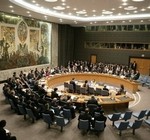India’s election as a non-permanent member of the Security Council after 19 years is a significant event not only for the country but also for the Council itself. It’s five veto-carrying members are supplemented by 10 elected members that change every two years. This year, apart from India, Brazil and South Africa have also made it; all of them are leading developing economies and aspirants for a permanent seat at the UN High table.
Indeed, as India’s Permanent Representative to the United Nations Hardeep Puri pointed out, the four BRIC nations – Brazil, Russia, India, China – will all be together in the Security Council, even if two of them will step down after two years. The quiet withdrawal of Canada, which has been a non-permanent member six times, in favour of Portugal, a country with which India is developing strong ties is another noteworthy development.
For India, two things stand out. One, the extent of the victory. In 1996, a India got only 40 votes, losing out to Japan which got 142. It was a diplomatic loss of face, since the then Prime Minister I K Gujral had confidently talked of an Indian victory. This time, hard work by Indian diplomats in rounding off every country paid off an India got 187 of the total 192 votes.
More significant is the fact that the election comes at a time when India has upped its campaign for a reform of the Security Council. Many nations around the world, including industrialised countries like Japan and Germany have been clamouring for the permanent members to be increased to reflect the new global realities. This campaign is definitely going to go up a notch now that many of these hopeful countries have come together in the non-permanent category. India has slowly worked to get the support of many countries on its bid, but there is no consensus yet on reforming the SC. Though many nations have made the requisite diplomatic statements backing India, the US and several others have not been unambiguous on the matter. That Holy Grail is still some time away.
The election as a non-permanent member thus is not a step towards getting full membership, but even so, India will be under some sort of scrutiny over the next two years and it will be called upon to take some tough decisions which may not always go down well with others, especially with its new friend the United States. Iran, for example is going to be a thorny affair, since not only the US but also much of Europe looks at the country’s growing nuclear ambitions with alarm. Where will India stand on the questions of sanctions? The Middle East is going to be another difficult issue, given that India has traditionally sided with the Palestine, though our relations with Israel are growing rapidly. It is also almost certain that there will be Pakistan and Afghanistan related issues that the Security Council will have to tackle, and both these countries have direct bearing on India.
Even so, it is an indication of India’s growing profile in the world that India won the election and that too so handsomely. But those gains could get dissipated if the country and its government do not build upon them to build a national consensus on key foreign policy issues. Equally, there will be a need for stronger and better ties with our neighbouring countries. It is going to be a challenging two years for India and its diplomatic skills.
Sidharth Bhatia is a freelance journalist and writer.
This article was exclusively written for Gateway House: Indian Council on Global Relations. You can read more exclusive content here.
For interview requests with the author, or for permission to republish, please contact outreach@gatewayhouse.in.
© Copyright 2010 Gateway House: Indian Council on Global Relations. All rights reserved. Any unauthorized copying or reproduction is strictly prohibited.


